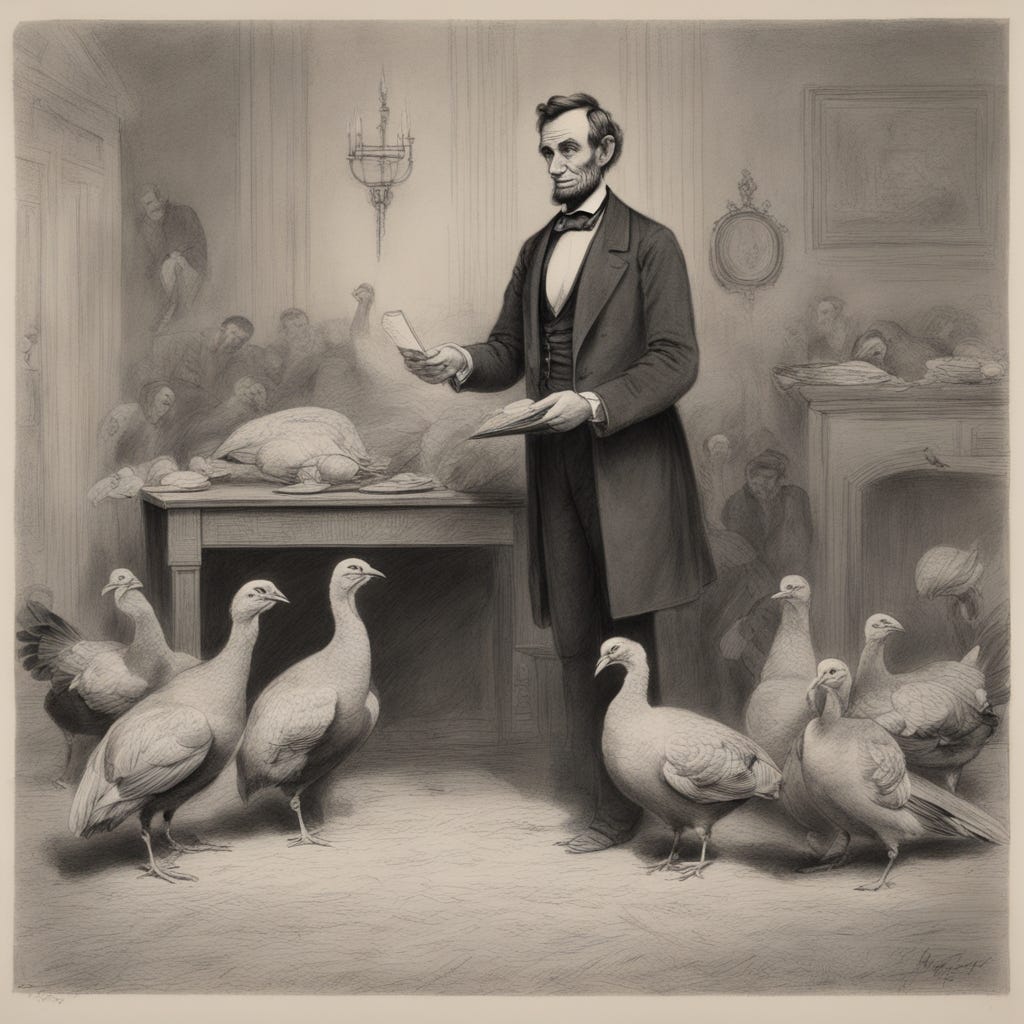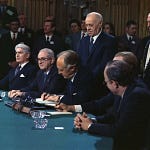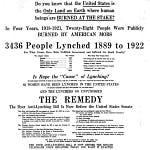Abraham Lincoln, the 16th President of the United States, is often remembered for his leadership during the Civil War, a time marked by immense national turmoil and loss. Yet, an often overlooked aspect of his character was his profound aversion to violence and harm, extending even to animals. This trait was notably exemplified in his interactions with Thanksgiving turkeys.
It was during the 1860s, amidst the height of the Civil War, that Lincoln reportedly pardoned a turkey intended for the White House's Thanksgiving meal at the pleading of his young son Tad. The turkey, “Jack” became a White House pet, and would be a frequent site around the White House grounds. This act, while seemingly minor in the broader scope of his presidency, reflected a deeper, personal aversion to violence that Lincoln carried throughout his life and his commitment to provide his children with a modicum of normalcy in their own lives, which would be anything but normal.
From a young age, Lincoln exhibited a gentle disposition towards animals. One anecdote tells of a young Lincoln, who, upon attempting to kill a chicken, was so stricken by the act that he swore never to harm an animal again. This incident was not an isolated one. During his life, he had multiple encounters that showcased his empathy and kindness towards animals.
As a child, he would scold his friends against harming turtles or stepping on bugs, quipping: “an ant’s life is to it as sweet as our’s is to us.” While riding the legal circuit as a young lawyer, Lincoln was known to go out of his way to help animals in distress. He once stopped in a rainstorm to return baby birds to their nest after they had fallen out, showcasing a level of compassion that was quite rare in that era and, indeed, was retold as a negative mark on his masculine character by his fellow jurists. On another occasion, he is said to have risked his own safety to save his dog, Fido, who had fallen through ice–not something that would be a common reaction in the 19th century American midwest.
These stories, while seemingly small, painted a picture of a man deeply troubled by violence and suffering. This aversion wasn't limited to animals. Lincoln's presidency, dominated by the Civil War, was a period of great internal conflict for him. He presided over a nation divided, a time when death and destruction were daily realities. Yet, even in such times, his aversion to harm and violence remained a guiding principle.
Lincoln's empathy was not without personal cost. He struggled with depression and feelings of inferiority throughout his life. His melancholy was well-documented, and he often spoke of his mental health struggles. However, these struggles also imparted a strength and resilience to Lincoln, enabling him to lead the nation through its darkest hours.
His philosophy, as he once put it, was to "be sure to put your feet in the right place and then stand firm." This mindset was evident in both his political and personal life. His decision to pardon the Thanksgiving turkeys, an obviously small anecdote in the scope of a much broader life that should not be extrapolated from too liberally, was nonetheless not a political act but a manifestation of his personal convictions–be that his unwillingness to harm the animal or his intention to please his young son.
Lincoln's legacy is often defined by his leadership during the Civil War and his role in bringing to an end the manifest injustice of slavery. However, his compassion towards animals and his personal struggles with mental health add depth to our understanding of him as a leader and a person. They remind us that even in times of great conflict and hardship, empathy and kindness can be powerful guiding principles.
In the end, Lincoln's pardon of the Thanksgiving turkeys is more than just a quirky historical footnote. It is a reflection of his character and values, a testament to a president who, despite being engulfed in a war that tore the nation apart, retained a core of compassion and empathy, extending even to the smallest creatures.
As we reflect on this story of Abraham Lincoln and the Thanksgiving turkey, it invites us to consider the challenges in our own lives that can give rise to deeper convictions of character. Lincoln's story teaches us that our struggles and trials can be the forge in which our character is tempered and strengthened. So, let us also acknowledge and appreciate the difficulties we face. They are not just obstacles but opportunities to develop a richer, more compassionate perspective towards ourselves and the world around us.
Lincoln's life, marked by both profound hardship and profound empathy, serves as a poignant reminder that the challenges we endure can often be the catalysts for cultivating enduring values and principles. So, this Thanksgiving, let's be thankful not only for our blessings but also for the struggles that shape us into stronger, more empathetic individuals, capable of extending our compassion beyond ourselves.
Thanksgiving was celebrated in the United States prior to 1864, but it was not formally recognized as a holiday. On what would be his final Thanksgiving, in 1864, President Lincoln formally proclaimed the last Thursday in November as Thanksgiving. His address is as follows:
A Proclamation
It has pleased Almighty God to prolong our national life another year, defending us with His guardian care against unfriendly designs from abroad and vouchsafing to us in His mercy many and signal victories over the enemy, who is of our own household. It has also pleased our Heavenly Father to favor as well our citizens in their homes as our soldiers in their camps and our sailors on the rivers and seas with unusual health. He has largely augmented our free population by emancipation and by immigration, while He has opened to us new sources of wealth and has crowned the labor of our workingmen in every department of industry with abundant rewards. Moreover, He has been pleased to animate and inspire our minds and hearts with fortitude, courage, and resolution sufficient for the great trial of civil war into which we have been brought by our adherence as a nation to the cause of freedom and humanity, and to afford to us reasonable hopes of an ultimate and happy deliverance from all our dangers and afflictions:
Now, therefore, I, Abraham Lincoln, President of the United States, do hereby appoint and set apart the last Thursday in November next as a day which I desire to be observed by all my fellow-citizens, wherever they may then be, as a day of thanksgiving and praise to Almighty God, the beneficent Creator and Ruler of the Universe. And I do further recommend to my fellow-citizens aforesaid that on that occasion they do reverently humble themselves in the dust and from thence offer up penitent and fervent prayers and supplications to the Great Disposer of Events for a return of the inestimable blessings of peace, union, and harmony throughout the land which it has pleased Him to assign as a dwelling place for ourselves and for our posterity throughout all generations.
In testimony whereof I have hereunto set my hand and caused the seal of the United States to be affixed.
Done at the city of Washington, this 20th day of October, A.D. 1864, and of the Independence of the United States the eighty-ninth.
ABRAHAM LINCOLN.













